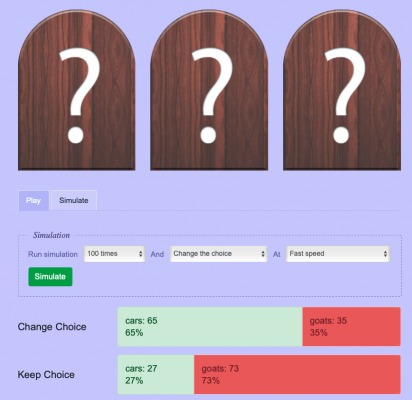No! Once one door has been opened, you know it's not behind that one, but there is still an equal chance of its being behind either of the others (and having always been there). The only difference is that now there are only two possibilities, so that that equal chance of it being behind whichever door you finally choose is 1 in 2, rather than the 1 in 3 which it was originally. It's just the same as if you started with only two doors.
Can we move onto discussing Carrot In A Box tactics instead?
And that's where the "paradox" lies. Yes, once a door is shown to be the wrong door,
and it will always be a wrong door, there is an equal chance the prize is behind one of the other two. And if someone is asked to make a first choice at that point, it's 50-50, because a door was eliminated
before the choice. The game played that way was never a choice among 3 doors, but a choice between 2 doors.
But that wasn't how the problem started. You picked from
3 doors. There's a 1 in 3 chance you were right, and that can't change.
Consider the problem this way: You pick your door. Then the host says "You can trade your door for the best prize behind
all the remaining doors - you don't have to choose which one, I'll show you." You then trade your 1 in 3 possibility for a 2 in 3 possibility. He opens the other two doors,
each of which has a 1 in 3 possibility, and if the prize is behind
either of them you win. This is essentially the same as the original problem,
and essentially the same as trading your one original chance for two chances.
Imagine there were a million doors, all closed, and you picked one of them. You have a one in a million chance of picking right with this first choice, and a 999,999 in a million chance of being wrong. Then the host says "You can trade your door for the best prize behind all the remaining doors - you don't have to choose which one, I'll show you." You are now trading your one chance for 999,999 chances.
---------
Edit: I just thought of a much simpler way of proving it, although it won't help anyone actually struggling with the math.
- If you repeated the game over and over, but always stuck with your first choice, how often would you win? The chance of picking right is 1 in 3, so one third of the time.
- If you repeated the game over and over, but always stuck with your first choice, how often would you lose? The chance of picking wrong is 2 in 3, so two thirds of the time.
- If you repeated the game over and over, but always switched, how often would you win? If you picked wrong at first, then you would definitely win by switching, so two thirds of the time.
- If you repeated the game over and over, but always switched, how often would you lose? If you picked right at first, then you would definitely lose by switching, so one third of the time.


